Table of Contents[Hide][Show]
Magnesium deficiency has been linked to atherosclerosis/ heart disease and heart attack, alterations in blood lipids/ cholesterol, alterations in blood sugar, type 2 diabetes, hypertension, kidney stones, worsening insulin resistance, and the list goes on.
For those of you with prediabetes, it’s been shown that low magnesium intake increases your risk for developing type 2 diabetes in the first place, which is quite surprising.
Studies suggest that over the past 100 years our intake has gone from 500 mg day to 175-225 mg day, which is less than half of what we were consuming.
Why such a decrease?
As usual it comes down to our modern lifestyles and the reasons point to the use of fertilizer, nutrient depleted soils, plus excessive consumption of processed and packaged foods.
So what makes magnesium so special anyway? Let’s find out.
LISTEN TO THE PODCAST
CHAPTERS
1:34 Declining magnesium intake
3:21 What makes magnesium so special?
7:02 Causes of magnesium deficiency
8:35 Symptoms of magnesium deficiency
10:10 Magnesium’s benefits for type 2 diabetes and prediabetes
17:34 Magnesium-rich foods
19:42 Magnesium supplementation
Support the podcast by leaving a 5-star rating and review on Apple, Spotify or our Website – Thank You!
Miracle Magnesium Mineral
Magnesium is an electrolyte that’s involved in over 600 enzymatic processes in the body, meaning this mineral is a busy little body indeed!
Half of the body’s magnesium is in the bones and the other half is in the muscles and soft tissues of the body – organs, cells and so forth.
Magnesium is essential for:
- Energy metabolism
- Glucose utilization
- Protein synthesis
- Fatty acid synthesis and breakdown
- Muscle contraction
- ATPase functions – energy for cells
- For DNA synthesis
- Virtually ALL hormonal reactions
- Prevents coagulation and platelet aggregation – aka keeps our arteries healthy
- May suppress thrombus formation – aka helps prevent clogged arteries
- Improve cholesterol markers
- Calcium channels are magnesium dependent – aka our bone health
- Regulates cardiac cell function – aka our heart health
- And the list goes on
Pretty long list right, so it comes as no surprise that if we have a lack of magnesium, we’re going to have more than a few metabolic issues.
One of the most important things to know is that magnesium is a co-factor connected to carbohydrate metabolism and the way your body uses glucose (sugar).
Magnesium and Diabetes
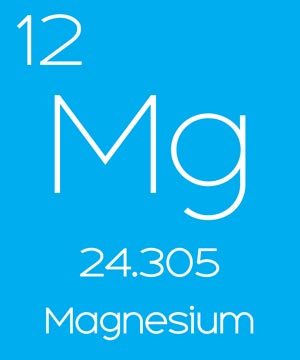
What’s interesting is that many people with type 2 diabetes are chronically deficient in magnesium, particularly people with uncontrolled glucose levels. Magnesium metabolism is regulated by insulin and glucose so this makes sense.
As we already pointed out, many people aren’t getting enough magnesium intake and on top of that, high glucose and high insulin increase the rate of magnesium excretion in the urine.
The problem is that a deficiency often goes unnoticed because, say if you go to the doctor they may only pick up on hypomagnesimia, which is a severe magnesium deficiency. This severe deficiency is more common in people with uncontrolled diabetes.
Therefore, people often have a chronic hidden deficiency that doesn’t necessarily effect the blood levels of magnesium, so it can be difficult to detect. The main reason for this is because magnesium is found in the cells and bones, with only around 0.3% found in the bloodstream.
This deficiency increases insulin resistance and lowers glucose uptake into the cells. And this magnesium deficiency has been associated with diabetes complications. That’s how important this miracle mineral really is.
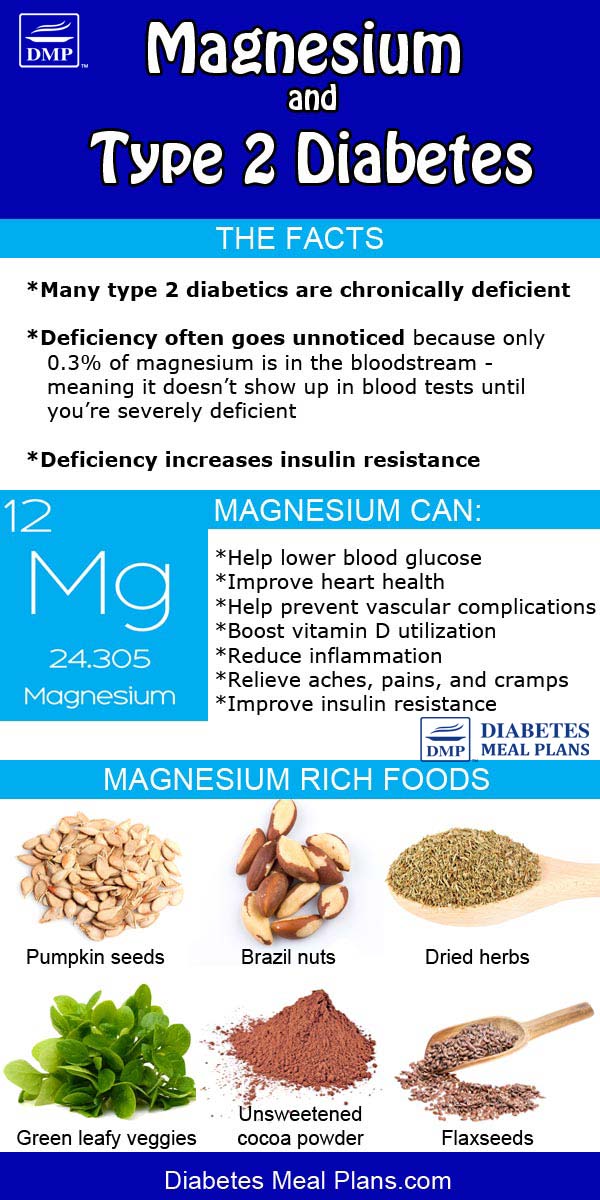
How does magnesium help diabetes?
May help lower blood glucose
In a study with 120 patients, half were randomized to take an oral magnesium supplement and the other half no supplement. After 16 weeks the magnesium group went from 144-123 mg/dl (8-6.8 mmol/l) and for fasting glucose from 145-134 mg/dl (8-7.4 mmol/l).
Most other studies have also shown benefits, no doubt due to magnesium’s role in carbohydrate metabolism.
Improves heart health and may prevent vascular complications
Have you ever had those heart flutters?
They’re called arrhythmia’s, so having adequate intake of magnesium can help decrease these.
Magnesium deficiency has been found to occur in over one third of patients with congestive heart failure. It’s associated with cardiovascular abnormalities such as acute myocardial infarction, arrhythmia (as just mentioned), dislipidemia, angina, and athlerosclerosis. And it’s linked to hypertension, a major risk factor for heart disease and stroke.
So if deficiency contributes to all those things, it only makes sense that adequate intake would help prevent them too.
Helps boost vitamin D utilization
Magnesium is a cofactor required to help vitamin D bind to it’s transport protein – meaning if you don’t have enough magnesium, there’s a good change you could also be vitamin D deficient.
Vitamin D deficiency is another common issue with diabetes, and has also been shown to increase risk of gestational diabetes. So taking magnesium may just help solve this issue, and getting more sun helps too.
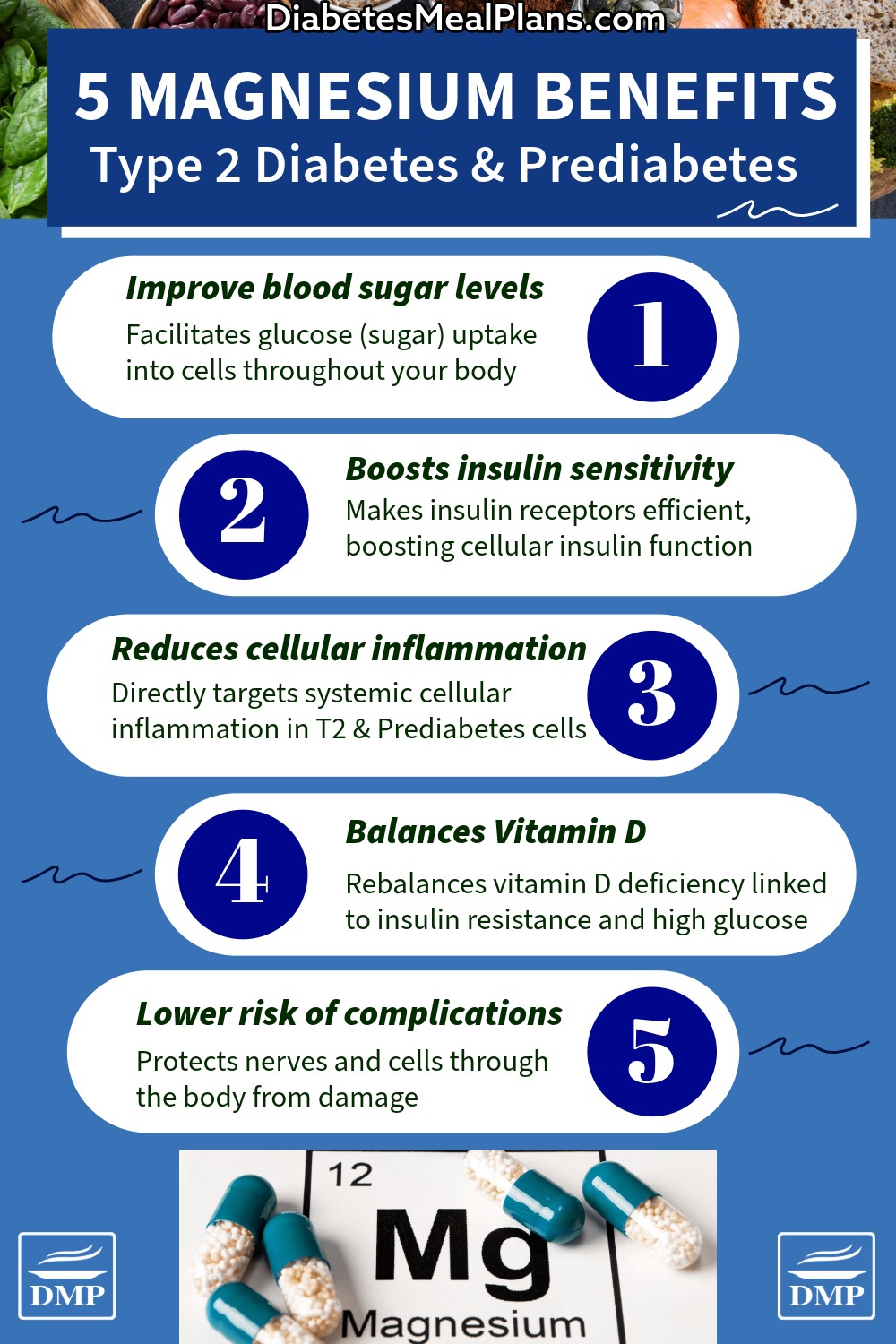
Reduce inflammation
Magnesium is considered the most anti-inflammatory nutrient around. Since diabetes is an inflammatory condition, then magnesium is also going to be a great help in this regard.
Reducing inflammation helps you lose weight and helps all your other symptoms, too.
Relieve aches, pains, and cramps
A common complaint is getting leg cramps or aches and pains, we all get them even if we’re not diabetic, but since dehydration can also be an issue, you can lose more electrolytes and suffer even more cramps, aches or pains.
So a great little helper is magnesium.
You can also use magnesium oil for this kind of thing, rubbing it onto the area that’s affected.
Improve insulin resistance
Magnesium is crucial to the insulin receptors, and may even be directly related to a transport protein called GLUT4, which helps glucose move out of the blood and into your cells. Many studies I looked at while doing all this research suggest that magnesium improves insulin sensitivity, so it can only be a good addition to your routine.
A couple of things I didn’t know is that lack of magnesium is a high predictor in the development of diabetic neuropathy – because it’s a mineral involved in nerve conduction. Magnesium is also associated with cognitive decline in type 2 diabetes. If you’re getting symptoms of either of these, talk to your doctor and give more magnesium a try.
Magnesium Rich Foods
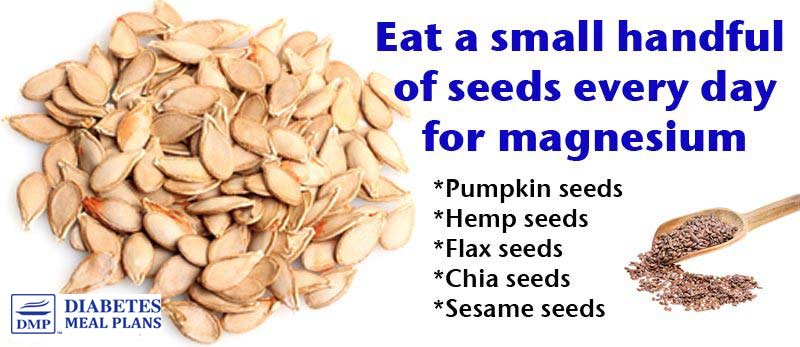
One of the best ways to get more micronutrients – vitamins and minerals – is to eat more real food. It’s common sense that packaged foods don’t contain the levels of vitamins and minerals we really need. A broccoli doesn’t need to be fortified with vitamins and minerals like a breakfast cereal!
Magnesium per 100 g of the food item
- Dried basil 711 mg
- Hulled hempseed 700 mg
- Dried cilantro/ coriander 694 mg
- Pumpkin seeds 594 mg
- Unsweetened cocoa 499 mg
- Dried dill 451 mg
- Flaxseed 392 mg
- Brazil nuts 376 mg
- Sesame flour and sesame paste (tahini) 362 mg
- Chia seeds 335 mg
- Raw cashews 292 mg
- Almonds or almond butter 279 mg
Not all the dried herbs and spices are listed but as you can see from the numbers above, they contain high levels of magnesium. So if you eat a good variety and include them more in your meals, you’ll be getting a good dose.
Best magnesium supplement
When it comes to magnesium supplements, like anything, they are not created equal. There are some poor quality supplements, and ones that are going to be far more effective. You want to choose a supplement that is highly bio available to your body. That simply means it has the type of magnesium that your body can absorb and utilize.
One of the common types of magnesium that you may find on the shelf comes in the form of magnesium oxide. You want to steer clear of this one. Although it has the highest percentage of magnesium, this magnesium is not available for absorption to the body.
The better absorbed forms of magnesium include magnesium amino acid chelate, magnesium phosphate, magnesium glycinate, magnesium orotate, and magnesium citrate, and magnesium threonate.
The best magnesium supplement recommendations are magnesium citrate and magnesium glycinate, as these are readily available and highly bioavailable – meaning your body will absorb them efficiently.
Recommended Magnesium Supplements
Powders, such as this one from Magnesi-Om, are often a great way to take magnesium for greater absorption.
If you prefer capsule, this glycinate is moe bioavailable than other forms such as oxide.
How much magnesium per day?
In terms of dosage, studies have shown the beneficial range is 250-480 mg per day. And taking magnesium is recommended for at least a few months to obtain all the benefits.
Also, be sure to talk to your doctor if you take any medications, particularly diuretics or antibiotics, as it’s always best to ensure there are no contraindications. And also if you have any kidney problems.
Magnesium is generally considered safe but it’s always good to double check.
If you found this helpful, please share, pin, or tweet the info to help others. Thanks!
TRANSCRIPT
Click Here to View
Dr. Jedha, Host
Hello wonderful people, welcome to episode 48. Today we’re diving deep into the fascinating world of magnesium and its numerous health benefits.
I first stumbled across the benefits of magnesium 20 years ago in a book “Magnesium: The Miracle Mineral” by Dr Sandra Cabot. It’s had good use over the years and it never ceases to amaze just how many benefits magnesium really has, for everyone.
Studies suggest that over the past 100 years our magnesium intake has gone from 500 mg day to 175-225 mg day, which is less than half of what we were consuming.
Why such a decrease?
As is often the case, it comes down to our modern lifestyles and the reasons point to the use of fertilizer, nutrient depleted soils, stress, plus, excessive consumption of processed and packaged foods that offer no nutritional value.
Magnesium deficiency has been linked to atherosclerosis, heart disease and heart attack, alterations in blood lipids/cholesterol, alterations in blood sugar, type 2 diabetes, hypertension, kidney stones, premenstrual syndrome and psychiatric disorders, and the list goes on.
But of course, today we’re here to chat about magnesium specifically in relation to type 2 diabetes and prediabetes.
We’ll explore why magnesium is so essential, how it impacts various bodily functions, and the significant improvements it can bring to elevate diabetes health when we ensure adequate intake, and of course, like all our episodes there will be a combination of valuable insights and practical tips as well.
So what makes magnesium so special?
Magnesium is an electrolyte that’s involved in over 600 enzymatic reactions and hundreds of processes throughout the body, meaning this mineral is a busy little body indeed!
60% the body’s magnesium is in the bones and 40% is in the muscles and soft tissues of the body – organs, cells and so forth. Less than 1% circulates in the blood.
Magnesium is essential for:
- Energy metabolism
- Glucose utilization
- Protein synthesis
- Fatty acid synthesis and breakdown
- Muscle contraction
- Cellular energy
- For DNA synthesis
- Virtually ALL hormonal reactions require magnesium
- Magnesium prevents coagulation and platelet aggregation – keeping our arteries healthy
- It improves cholesterol markers
- Calcium channels are magnesium dependent – supporting our bone health
- Magnesium helps regulate cardiac cell function – protecting our heart health
- Organ function
- Immune function
- And the list goes on
Pretty long list right, so it comes as no surprise that if we have a lack of magnesium, we’re going to have more than a few metabolic issues.
What’s interesting is that research shows us that in people living with obesity, prediabetes, metabolic syndrome or type 2 diabetes, there is a high rate of magnesium deficiency.
Some research suggests that many people living with type 2 diabetes are chronically deficient in magnesium, particularly people with uncontrolled glucose levels. Magnesium metabolism is regulated by insulin and glucose so this makes sense.
In fact, another part of the challenge is that high glucose and high insulin increase the rate of magnesium excretion in the urine.
The problem is that a deficiency often goes unnoticed because, say if you go to the doctor they may only pick up on hypomagnesimia, which is a severe magnesium deficiency. This severe deficiency is more common in people with uncontrolled diabetes.
You can get a blood test to test magnesium levels but as we established earlier, with less than 1% of magnesium circulating in the blood. You might very well have a chronic magnesium deficiency that doesn’t necessarily affect the blood levels of magnesium, so it can be difficult to detect.
This deficiency increases insulin resistance and lowers glucose uptake into the cells. And this magnesium deficiency has been associated with more emergency complications. That’s how important this miracle mineral really is.
As we covered earlier, a big contributor to deficiency is not getting enough magnesium in our diet. The modern western diet is filled with processed and packaged foods that lack nutrition, fertilizers, nutrient depleted soils, demineralized water; along with low intake of vegetables and fruits, legumes and nutrient dense foods.
There are also a range of other possible contributors:
- impaired gastrointestinal absorption, such as in celiac, IBS, or crohn’s
- Diuretic medications
- Use of proton pump inhibitors
- Alcohol abuse
- Genetic factors sometimes play a role
- Intense exercise where we sweat can deplete magnesium
- Kidney diseases can impair magnesium function
- Stress can deplete magnesium
- And as we age, our magnesium status can be further depleted due to decreased absorption in the intestines.
In type 2 diabetes, two main factors frequently noted are low magnesium intake and increased loss of magnesium through urination.
The key point here is that there are many possible contributors and deficiency is fairly common.
When it comes to symptoms, deficiency can manifest in non-specific things like depression, fatigue, weakness, loss of appetite, nausea, muscle spasms and arrhythmias – things that may not necessarily be thought of in relation to a mineral deficiency.
As deficiency worsens other symptoms can include tremors, muscle agitation, cramps, cardiac arrhythmia, personality changes and depression.
As we just established age can influence magnesium absorption and deficiency can be common. As we age, symptoms related to magnesium deficiency can be fatigue and weakness, sleep disturbances like insomnia, emotional imbalances or anxiety, dizziness and disruptions to cognitive function.
Magnesium is a very important mineral involved in many functions and processes of the body.
If magnesium is so important, what improvements can it make to our health when we get enough of it? Especially in type 2 diabetes or prediabetes. And the answer is, it can make a huge difference.
While we know that your dietary intake of magnesium is important, and we’ll be covering magnesium-rich foods soon, generally when we evaluate the research we’re looking at oral supplementation with magnesium. So let’s look closer at the benefits.
Magnesium plays a crucial role in carbohydrate metabolism and the way the body uses glucose. It acts as a co-factor for various enzymes involved in glucose metabolism, which helps in the efficient utilization of glucose by the body. This is particularly important to you, as proper glucose metabolism is essential for maintaining healthy blood sugar levels and overall metabolic health.
The good news is, increasing magnesium intake can help improve blood sugar levels, including fasting levels.
In one study, half of the participants were randomized to take an oral magnesium supplement and the other half no supplement. After 16 weeks the magnesium group saw a reduction in blood sugar levels of 21 mg/dl or 1.2 mmol/l and a reduction in fasting levels of 11 mg/dl or 0.6 mmol/l). Now, I’m including both mg/dl and mmol/l because we have members and listeners from all over the world, and those numbers will be dependent on where you live.
Magnesium has also been shown to lower A1c by an average of 0.22%.
Magnesium and insulin influence each other; insulin helps regulate magnesium levels, while magnesium is essential for insulin and glucose functions.
As we just covered, magnesium is crucial for processing carbohydrates, mainly by affecting insulin receptors and improving insulin sensitivity. Insulin triggers important signaling pathways that regulate glucose transport and storage. Magnesium supports these pathways and the movement of glucose into cells. Low magnesium can disrupt these processes, leading to higher blood sugar levels and magnesium deficiency is known to cause alterations in insulin sensitivity.
In short, Magnesium is crucial to the insulin receptors, and may even be directly related to a transport protein called GLUT4, which helps glucose move out of the blood and into your cells. Overall, magnesium helps to maintain better blood sugar levels and reduces insulin resistance.
Magnesium is essential for nerve function, and being deficient is associated with a complication known as diabetic neuropathy, damage to nerves. So, maintaining adequate magnesium levels can help protect against nerve damage and this complication.
When reviewing multiple randomized controlled trials, the results show a nice reduction in blood pressure, especially for systolic blood pressure with an average reduction of 7.69 mmHg. For diastolic blood pressure the average reduction was –2.71 mmHg.
Magnesium is a cofactor required to help vitamin D bind to its transport protein – meaning if you don’t have enough magnesium, there’s a good chance you could also be vitamin D deficient. Vitamin D deficiency is another common issue in diabetes so taking magnesium is important to boost and maintain vitamin D levels.
Low magnesium levels can lead to inflammation, which is a factor in many conditions like diabetes and heart disease. What we’re talking about here is chronic inflammation at a cellular level. Magnesium deficiency can activate cells that cause inflammation and increase stress in the body, leading to the release of substances that promote inflammation. Increased inflammation can damage blood vessels and affect how the body processes fats and sugars and it also worsen insulin resistance. Magnesium also plays a role in regulating genes related to metabolism and inflammation.
In other words, magnesium helps control inflammation, and not getting enough of it can make chronic inflammation in the body’s cells worse.
Sufficient magnesium can help improve heart health and prevent vascular complications.
Magnesium is crucial for regulating the stress response. It acts as a natural relaxant, helping to moderate the nervous system and reduce the physiological impact of stress. When magnesium levels are low, the body’s ability to manage stress is compromised, which can create a vicious cycle of increasing stress and further magnesium depletion.
A common complaint is getting leg cramps or muscle aches and pains, we all get them from time to time. Since dehydration can be an issue, you can lose more electrolytes and suffer even more cramps, aches or pains. So a great little helper here is magnesium.
So, overall there are multiple health benefits from taking a magnesium supplement.
For those with prediabetes, all of the things we’ve covered already, are obviously relevant for you too. And it has been noted in multiple studies that increasing magnesium reduces risk of type 2 diabetes, so that’s an added bonus as well.
As we’ve covered, one of the key issues is that people don’t eat enough magnesium. One of the best ways to get more micronutrients – vitamins and minerals – is to eat more real food, and minimize processed and packaged foods.
If you’re following our T2Diet, your magnesium levels will be much improved because the T2Diet is filled with nutrient dense foods, foods packed with high quality nutrition.
In terms of specific foods high in magnesium, nuts and seeds are particularly beneficial, seeds particularly so. If you can include a small handful of seeds each day, this can boost your magnesium. Seeds like pumpkin seeds, flax seeds, hemp seeds, chia seeds and sesame seeds. Brazil nuts, cashews and almonds are also magnesium-rich. Dried herbs such as basil, cilantro and dill are high in magnesium, so using dried or fresh herbs to flavor food is great. Legumes and avocados, and all your leafy greens and green veggies like spinach and broccoli for example. Unsweetened cocoa and dark chocolate are also magnesium-rich. Really when it comes to your diet, just aim for a variety of fresh foods, lots of veggies and regular intake of nuts and seeds.
Optimal magnesium requirement with food is considered to be 320 mg/day for women and 420 mg/day for men, but that’s in healthy people as we know higher amounts are required with health conditions, including diabetes.
While we know that your dietary intake of magnesium is important, the research looks at supplementation with magnesium, and that is certainly beneficial.
One of the common types of magnesium that you may find on the shelf comes in the form of magnesium oxide. You want to steer clear of this one. Although it has the highest percentage of magnesium, this magnesium is not available for absorption to the body. It also causes more diarrhea and gastro effects than other forms of magnesium. The better absorbed forms of magnesium include magnesium amino acid chelate, magnesium phosphate, magnesium glycinate, magnesium orotate, and magnesium citrate. Magnesium citrate and magnesium glycinate are two very common types that are Best Absorbed and Highly Bioavailable Forms of Magnesium. We’ll leave some recommended magnesium supplements in the show notes so please head to Type2DiabetesTalk.com and find those alongside episode 48.
In terms of dosage, studies have shown the beneficial range is 250-480 mg per day. And taking magnesium is recommended for at least a few months to obtain all the benefits.
For the most part, magnesium is considered safe to use. In most cases, even if you take too much magnesium, the excess is generally excreted by the kidneys through urine.
A few things to consider are that people with impaired kidney function may not be able to excrete magnesium as effectively, so being aware of this and cautious with magnesium supplementation is important. For example, if you were to increase magnesium and experience nausea, vomiting, low blood pressure, muscle weakness, and irregular heartbeats, that would raise a concern that you may have too much magnesium. Magnesium can interact with certain medications, such as antibiotics and diuretics – if you’re taking these or really any medication, it’s always best to consult with your doctor first. When starting magnesium you may get diarrhea or soft bowel movements, because it draws water into the bowel. This can actually be a great thing for those suffering constipation but something good to be aware of if you take a dose and are to leave the house. It might not be fun if you weren’t near a bathroom!
Well, we’ve covered a lot today, especially the incredible importance of magnesium for our overall health, and in particular when managing type 2 diabetes and prediabetes. We’ve delved into how magnesium supports numerous bodily functions, from energy metabolism to heart health, and its crucial role in managing blood sugar levels and reducing complications associated with diabetes. We’ve also discussed practical ways to increase magnesium intake through diet and supplements, ensuring that you can take actionable steps towards improving your health. Remember to check out the show notes on Type2DiabetesTalk.com alongside episode 48 for recommended magnesium supplements and other info.
Until next week, take care.
Dr Jedha over and out.


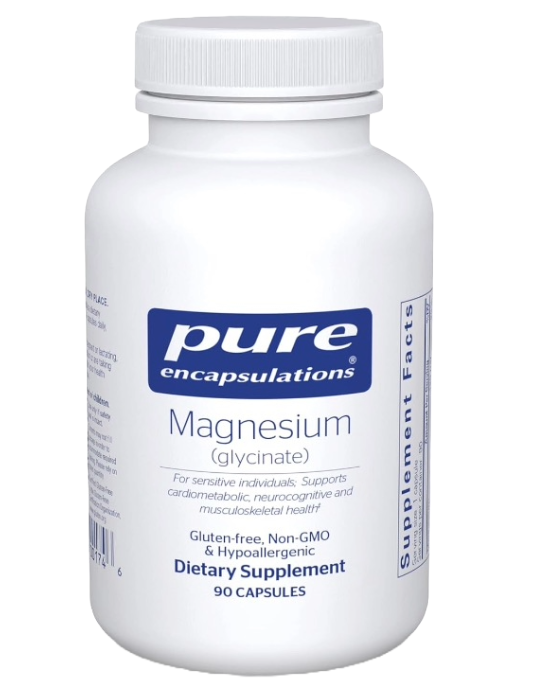

Jason
I’m in the pre-diabetic zone and want to do what I can to reverse it. My Glucose came in at 106 and 108 over the past two annual doc check ups. Enough for my doc to spend time discussing. I’m pretty active/fit, not overweight at all….So it’s a little concerning for me. There is room for dietary changes though.
As for Magnesium….Is there a way to actually assess if a deficiency exists before actually increasing my intake?
As for Calcium….a bit nervous to add that as I think I prob get a fair amount through diet. Can I just take Mag. alone?
Lastly, I just started taking a Cinnamon/Chromium/Biotin supplement that’s supposed to be geared toward support blood sugar health. I’ve heard about Cinnamon benefits….but not the latter two. Appreciate any insights/thoughts.
Sorry for all the questions…..Great site! Thanks!
Emily - Dietitian (MS, RD)
Glad to hear you’re taking a proactive approach to your health, Jason.
Diet is a huge factor in prevention– based on research we encourage people to follow a low carb diet and stick to foods primarily from this list.
As the article mentions, a blood test is not 100% telling with regards to magnesium levels, but unfortunately there are not any better ways to test for magnesium that I am aware of. Magnesium is generally safe for most people, but you should always address your concern with your doctor if you feel you may end up taking too much. It certainly can be taken by itself, some nutrients work better in pairs but there is no adverse effect from taking it by itself.
Find more information on chromium in the hyperlink; we have not specifically written an article on biotin, but research suggests biotin may help lower blood sugar when taken in conjunction with chromium.
Farah Khan
Hi ,I am hypertension patient and taking medicine for it but I am getting weak as I am 40years old and Hypertension is heridity
Can u suggest me diet??
Emily - Dietitian (MS, RD)
Many of our members find following a low carb diet to be both beneficial to their blood sugar and blood pressure! Therefore, you may find consuming more foods from this list helps to improve your blood pressure, which may decrease your need for some medication. You should also discuss your concern of weakness with your doctor as this could be a side effect of the medication you are taking and your doctor may need to change or adjust your meds.
Tom C.
Hi,
Just read this article today July 04-18, so I’m a little late to the parade.
I find that very few of the articles about magnesium mention that another way to take magnesium is the apply it transdermally. Our skin is the largest organ of our body. Applying it to the skin allows it bypass the digestive system. This allows a higher percentage of bio-availability and gets around the intestinal issue of diarrhea. In older males it also helps to bolster DHEA levels naturally.
Dr. Carolyn Deans’ book “The Magnesium Mirage“, Dr. Mark Sircus’ “Transdermal Magnesium Therapy” and one of the earliest publications, “The Magnesium Factor” by Dr. Mildred Seelig are all excellent reads. Articles written by Daniel Reid are also informational.
There is some good reading by the manufacturer of the transdermal product I use – Ancient Minerals. They have 2 versions of it, with the second (my choice) also having MSM added.
As always consult your doctor if you have concerns, but Mg works for me and I control my T2 (A1c 5.4) with no meds.
Jedha: Nutritionist (MNutr)
Very true Tom – and having epsom salt baths works well for absorbing magnesium also because epsom salt is magnesium.
bert Kuit
Was a very interesting article!
Go tomorrow to my shop for the combination calcium/magnesium!
Greetings from Amsterdam.
Brian
There is a YouTube clip about how to make “molecular magnesium” at home .
It is very cheap and fixes more thab 170 ailments.
Lisbeth Sølvhøj
Fine input om Magnesium. I’ll recommend everyone to check out dr. Carolyn Dean MD and trained in natural medicin. She also sells her own Magnesium products along with other minerals. I have not tried those, since importing them to Denmark is quite costly. They are supposed to be very absorbable. Magnesium Chloride is WAY better than Epsom salt, and good for making Magnesium “oil” too. And it truly does work miracles on diabetes 2 -among SO many other ailments. As for calcium, be VERY careful with extra calcium. If you eat cheese, youghurt etc and have a fair amount in your drinking water, you probably get more than enough already. Plus it is added to a lot of products. Good luck to everybody.
PS removing your Magnesium deficiency is very likely to improove your mental wellbeeing too.
Kind regres Lisbeth
John Robertson
Magnesium sulfate is the scientific name for Epsom salt, which looks like table salt. Epsom salt baths are popular for softening and exfoliating skin, relaxation, drawing impurities out of skin and relieving migraine and cold or flu symptoms. The magnesium and sulfates in Epsom salt are easily absorbed through the skin and may increase magnesium levels in your body.
Jedha
Very true John, epsom salt baths are an excellent way to increase magnesium and are very relaxing, too!
Doreen Page
Can you take to much magnesium?
Jedha
Yes you can. The main side effect will be diarrhea, as your body will eliminate what it can’t use.
Roky
Very informative. I would like to ask if someone has kidney stones with diabetes then what should that person do to increase the intake of calcium and magnesium.
Thanks for a good article.
Jedha
Hi Roky, calcium is the mineral involved in forming stones, so often you don’t want to increase calcium. Magnesium on the other hand has been shown to reduce risk of developing stones. You should discuss this with your doctor.
Julie
Very persuasive. Do recommended doses of magnesium interfere with anti-coagulants?
Jedha
You can read about magnesium interactions here. And since this info simply outlines what the research shows, you should always check with your doctor before supplementation.
Mark
Hi Jedha, I’ve just started taking magnesium ( malate) supplement . It doesn’t have as ingredients any of the ones you mention. It is malate , magnesium stererate , silica, malic acid etc. Is this one adequate at 425 mg 3 pills? Or should I get the Kal one? Mark
Jedha
I can’t advise on the one you have Mark. The research suggests the types of magnesium listed above are the most bioavailable to the body, so it’s up to you.
Tara
Can I take with polycystic kidney disease?
I have high glucose, with bad peripheral neuropathy ?
Jedha
Please check with your doctor Tara.
Janet hilton
Is it ok to take magnesium without calcium? I have high blood calcium, very low Vit D-i take supplements- and have diabetes type 2 (hereditary), diagnosed over 12 years ago.
Jedha
Many people do take magnesium without calcium without any issues. Adequate levels of magnesium are essential for the absorption and metabolism of calcium and vitamin D. Dr Axe suggests that “experts believe that one of the reasons magnesium supplements are so beneficial is because they help counterbalance high levels of calcium.” For more personal advice, you should check with your doctor as they know your history.
Jean
Very helpful info.
Vickie
I just found out I am diabetic. I a lost tO say the Least.
Jedha